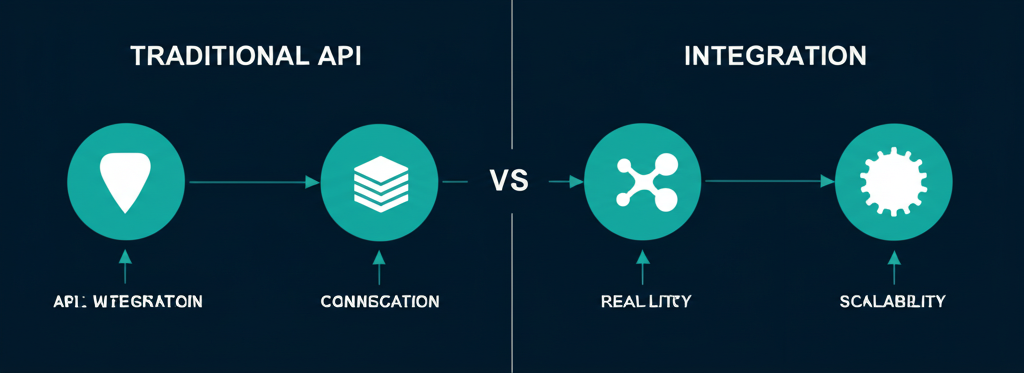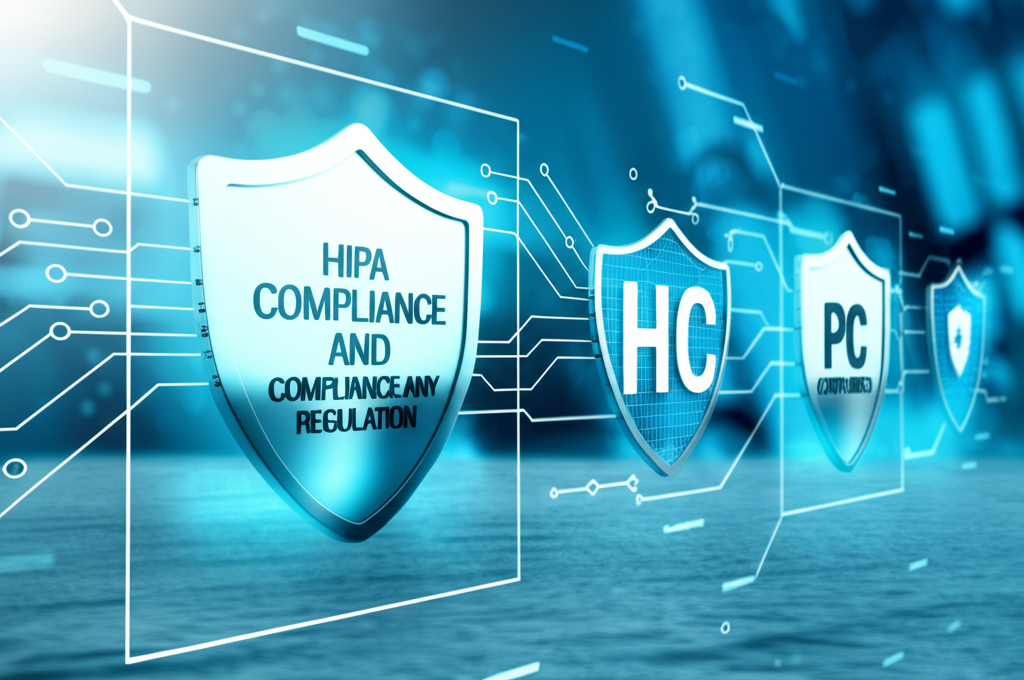
The Evolution of AI Integration: From Custom APIs to MCP
Explore how the Model Context Protocol is revolutionizing the way organizations integrate AI models with their enterprise systems, replacing complex custom APIs with a standardized approach.
Jennifer Lee
Chief Technology Strategist
The integration of AI models with enterprise systems has traditionally been a complex, time-consuming process requiring custom API development for each integration point. The Model Context Protocol (MCP) is changing this paradigm, offering a standardized approach that dramatically reduces development time while enhancing security and scalability.
The Challenge of Traditional AI Integration
Before the emergence of the Model Context Protocol, organizations faced numerous challenges when integrating AI models with their existing systems:
- Custom Development Overhead: Each integration point required custom API development, resulting in significant engineering resources and time.
- Inconsistent Security Models: Different integration approaches led to inconsistent security implementations and potential vulnerabilities.
- Limited Reusability: Custom integrations were often tightly coupled to specific AI models or systems, limiting their reusability.
- Maintenance Burden: As AI models and enterprise systems evolved, maintaining these custom integrations became increasingly complex and resource-intensive.
- Scaling Challenges: Custom integrations often struggled to scale effectively as usage increased or deployment expanded.
These challenges resulted in extended development timelines, increased costs, and limited the ability of organizations to fully leverage AI capabilities across their enterprise.

Enter the Model Context Protocol
The Model Context Protocol (MCP) represents a paradigm shift in how AI models interact with enterprise systems. Rather than requiring custom API development for each integration point, MCP provides a standardized protocol that defines how AI applications access data, prompts, and tools.
Key components of the MCP approach include:
- Standardized Integration: A single, consistent protocol replaces custom integrations, significantly reducing development time and complexity.
- Model Independence: MCP works with any LLM provider, allowing organizations to switch models without rewriting integration code.
- Security Controls: Built-in patterns for human approval and security checks enhance governance and compliance.
- Extensibility: New data sources and tools can be easily integrated through the standardized protocol.
- Modularity: MCP separates LLM interaction logic from data and tool access logic, improving maintainability.
Real-World Impact: Case Studies
Financial Services: 70% Reduction in Integration Time
A leading financial services organization was struggling with the integration of AI models into their customer service systems. Using traditional custom API approaches, each integration point required 3-4 weeks of development time and significant security review.
After adopting MCP and the MCP Tool platform:
- Integration time was reduced by 70%, from weeks to days
- Security reviews were streamlined due to the consistent security model
- The organization was able to easily switch between different LLM providers for different use cases
- Maintenance overhead was significantly reduced
"MCP has transformed how we approach AI integration. What used to take our team weeks now takes days, and the standardized security model has significantly reduced our compliance concerns."
— Sarah Johnson, CTO, Enterprise Financial Services
Healthcare: Enhanced Compliance and Flexibility
A healthcare provider needed to integrate AI capabilities into their patient management systems while ensuring strict HIPAA compliance. Their initial approach using custom integrations resulted in inconsistent security implementations and compliance concerns.
After implementing MCP:
- A consistent security and compliance model was established across all AI integrations
- Development time was reduced by 65%
- The organization gained the flexibility to use different AI models for different clinical scenarios
- Audit and compliance reporting was significantly simplified
The Technical Evolution
From a technical perspective, the evolution from custom APIs to MCP represents a significant advancement in how AI models interact with enterprise systems:
| Aspect | Custom API Approach | MCP Approach |
|---|---|---|
| Integration Method | Custom API development for each integration point | Standardized protocol with consistent implementation |
| Development Time | Weeks to months per integration | Days to weeks for initial setup, hours for additional integrations |
| Security Model | Inconsistent, implementation-specific | Standardized, built-in security patterns |
| Model Flexibility | Often tightly coupled to specific models | Model-agnostic, easy switching between providers |
| Maintenance | High overhead, complex dependencies | Reduced overhead, standardized approach |
| Scalability | Often limited by custom implementation | Designed for enterprise-scale deployment |
The Future of AI Integration with MCP
As MCP continues to evolve and gain adoption, we anticipate several key developments in the AI integration landscape:
- Ecosystem Growth: An expanding ecosystem of MCP-compatible tools, connectors, and services will further accelerate integration capabilities.
- Industry-Specific Solutions: Specialized MCP implementations for industries like healthcare, finance, and manufacturing will address unique regulatory and operational requirements.
- Advanced Governance: Enhanced governance capabilities will provide organizations with greater control and visibility over AI interactions.
- Cross-Organization Collaboration: Standardized MCP implementations will facilitate AI integration across organizational boundaries, enabling new collaborative scenarios.
- AI Agent Orchestration: MCP will evolve to support the orchestration of multiple AI agents working together on complex tasks.
Getting Started with MCP
Organizations looking to leverage the benefits of MCP for AI integration can get started with the following steps:
- Evaluate current AI integration approaches and identify pain points
- Explore the MCP specification and understand the core concepts
- Implement a pilot project using MCP Tool to experience the benefits firsthand
- Develop a strategic roadmap for transitioning existing integrations to MCP
- Build internal expertise through training and hands-on experience
The transition from custom API integrations to the Model Context Protocol represents a significant advancement in how organizations leverage AI capabilities. By adopting MCP, organizations can dramatically reduce development time, enhance security, and gain the flexibility to evolve their AI strategy as new models and capabilities emerge.
The future of AI integration is here, and it speaks MCP.

Jennifer Lee
Chief Technology Strategist
Jennifer Lee is a technology strategist with over 15 years of experience in enterprise architecture and AI integration. She has helped numerous Fortune 500 companies transform their technology landscape and leverage AI capabilities effectively.
Related Articles

MCP vs. Traditional Integration Methods: A Performance Comparison
A detailed comparison of MCP against traditional integration methods like custom APIs, webhooks, and direct database connections. See how MCP outperforms in speed, security, and maintainability.

The Future of AI Integration with MCP: 2024 and Beyond
Explore the roadmap for MCP and how it will shape the future of AI integration. This forward-looking analysis examines emerging trends in AI integration and how MCP is positioned to address the challenges of next-generation AI systems.

MCP Compliance in Regulated Industries: Healthcare, Finance, and Beyond
A comprehensive guide to implementing MCP in regulated industries. Learn how to meet compliance requirements for HIPAA, GDPR, SOC 2, and other regulatory frameworks while leveraging the power of AI integration.
Comments
Comments are coming soon! Check back later to join the discussion.
Table of Contents
Popular Articles
Popular Tags
Subscribe to our Newsletter
Get the latest MCP insights delivered to your inbox
Stay ahead of the curve
Get the latest insights on AI integration, MCP developments, and industry best practices delivered to your inbox.
We care about your data. Read our Privacy Policy.



